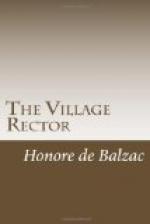“If we have a war, France will be without horses, as Napoleon was in 1813, when, being reduced to those of France only, he could not profit by his two victories of Lutzen and Botzen, and so was crushed at Leipzig,” cried Grossetete. “If peace continues, the evil will only increase. Twenty-five years from now the race of cattle and horses will have diminished in France by one half.”
“Monsieur Grossetete is right,” remarked Gerard. “So that the work you are undertaking here, madame,” he added, addressing Veronique, “is really a service done to the country.”
“Yes,” said the juge de paix, “because Madame has but one son, and the inheritance will not be divided up; but how long will that condition last? For a certain length of time the magnificent culture which you are about to introduce will, let us hope, belong to only one proprietor, who will continue to breed horned beasts and horses; but sooner or later the day must come when these forests and fields will be divided up and sold in small parcels. Divided and redivided, the six thousand acres of that plain will have a thousand or twelve hundred owners, and thenceforth—no more horses and cattle!”
“Oh! as for those days”—began the mayor.
“There! don’t you hear the What is that to me? Monsieur Clousier talked of?” cried Monsieur Grossetete. “Taken in the act! But, monsieur,” resumed the banker, gravely addressing the dumfounded mayor, “those days have really come. In a radius of thirty miles round Paris the land is so divided up into small holdings that milch cows are no longer seen. The Commune of Argenteuil contains thirty-eight thousand eight hundred and eighty-five parcels of land, many of which do not return a farthing of revenue. If it were not for the rich refuse of Paris, which produces a fodder of strong quality, I don’t know how dairymen would get along. As it is, this over-stimulating food and confinement in close stables produce inflammatory




